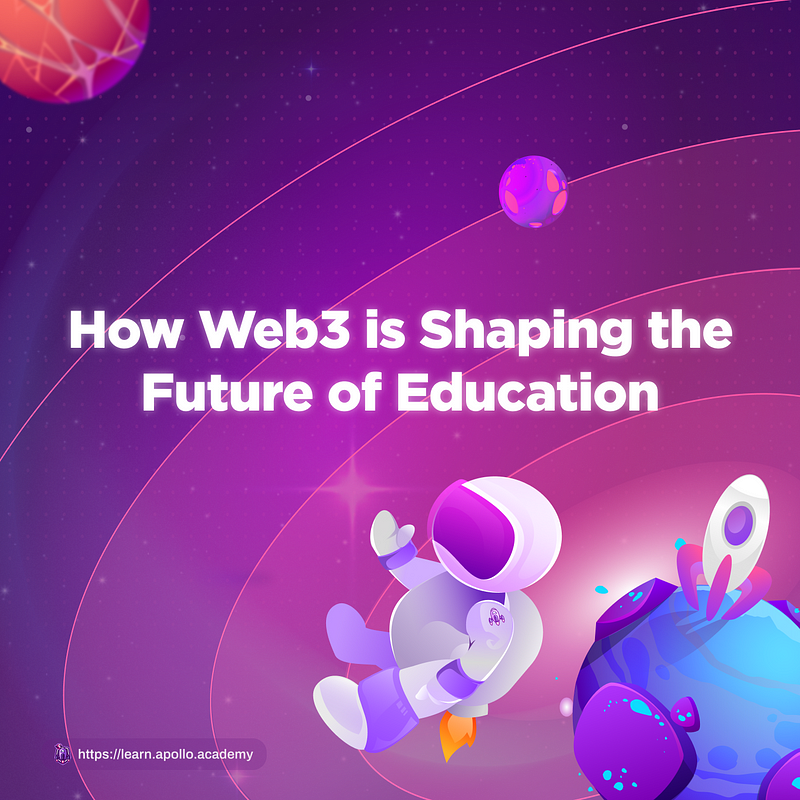How Web3 is Shaping the Future of Education
With 2023 just right around the corner, we’ve been spending some time reflecting on how what we’re doing at Apollo Academy can make a…
With 2023 just right around the corner, we’ve been spending some time reflecting on how what we’re doing at Apollo Academy can make a ripple effect on the education sector as a whole.
While Web3.0 has undeniably made waves in several huge and influential industries across the globe, our focus has been on the education sector. Education and technology go hand in hand to fuel the growth and change in societies. They exist as key pillars to support development. And the onset of the COVID-19 pandemic has only cemented the need for change.
The Evolution of Web3
Having taken the world by storm, Web3 technology offers users the opportunity to create, communicate and swap digital content. Coined the decentralised internet, it runs on blockchain technology and aims to provide security and transparency. From AI and metaverses to cryptocurrencies, this ecosystem relies on validators and data verifiers instead of government authorities.
In comparison to its predecessors, Web1.0 offered access to a plethora of information and data while Web2.0 introduced online communication between users. With enhanced interactivity, the next generation of the internet not only gives read and write features but also ownership. Content creators are no longer censored or controlled by larger, centralised entities. Instead, the decentralised web is the key to a liberalised society.
Bottlenecks in the Current Education System
The education sector has grown in line with the evolution of the internet. Web1.0 supported direct knowledge transfer from educational institutions to students. Meanwhile, Web2.0 saw the rise of online learning where educational portals were created by institutions. With the current Web3.0 ecosystem, users can get educational content from a myriad of sources; with the potential to solve the present bottlenecks that exist.
Lack of Access
Attending physical educational institutions remains the norm worldwide. Teachers and students rely on a physical set-up to interact and share knowledge. This poses restrictions for students who don’t have access to the institutions’ geographical locations. School curriculums are also structured in terms of semesters, with set timelines; restricting the freedom for students to easily resume their education if they’re unable to attend classes for a part of the semester.
High Costs
Education costs are considerably hefty if parents want to send their children to college; be it in their home country or overseas. Parents and students alike take out loans to pay college tuition fees, with financial aid only given to specific groups who meet the requirements. Furthering their education has become somewhat of a necessity for students who want to remain competitive in the workforce as companies expect a bachelor’s degree from candidates before considering their job application.
Insufficient Focus on Developing Practical Skills
Educational institutions often review and revise their curriculums periodically but not fast enough to keep up with technological and societal developments. A lack of focus on developing life skills exists and students are measured based on their grades and understanding of concepts. Schools adopt a regressive approach towards teaching, and this doesn’t necessarily prepare students for the real world since they lack the knowledge of how to apply learned concepts.
Web3.0’s Role in Changing the Educational Sector
Taking education to the next level, Web3.0 opens up a universe of possibilities by providing technological tools for teachers and students alike to create and access engaging study material. With all the data and information stored on the blockchain, teachers can easily extract data to analyse their students’ performance and students can generate reports on their progress to identify areas of improvement.
Building a Co-creating and Interactive Space
Instead of passively absorbing information, Web3.0 gives students the chance to co-create content; creating a community of learners and teachers who can benefit from each other. There’ll also be enhanced interactivity in virtual spaces like the metaverse that promotes the sharing of knowledge. Not to mention that Web3.0 technology lends itself to developing improved versions of online learning platforms to further entice students and facilitate learning.
Decentralised Education
While the traditional education system recognises formal certifications like college degrees, Web3.0 offers a myriad of certification options that are validated on the blockchain. From micro-credentials to NFTs and research papers, Web3.0 promotes continuous, life-long learning where learners can constantly find new projects to collaborate on and access online courses.
Introducing a World of Earning Opportunities
Similar to how students pursue college degrees to secure job opportunities, they can learn how to use Web3.0 technology and immediately apply their new skills and knowledge to start their own businesses and projects. Depending on their passions and interests, this space offers creative creators and entrepreneurs alike endless opportunities for growth. Plus, a low barrier to entry since they don’t have to fulfil any educational requirements before kick starting new ventures.
Through the Looking Glass
Taking these points into consideration and not discounting the success of the Web1.0 and Web2.0 education systems, we’re taking the first step towards making decentralised education a reality.
By building an educational platform, we’re offering learners worldwide the tools they need to embark on their ventures. With new features, mediums and content released every month, we work closely with thought leaders and KOLs in the space to produce high-quality content for our Apollonauts to take them to the moon with us. Join us on our mission today by checking out our socials:
Official Website: https://learn.apollo.academy
A2 Alpha Partnership Program: https://learn.apollo.academy/a2-alpha-application
Twitter: https://twitter.com/a2cademy
Discord: https://discord.gg/saladventures
Instagram: https://www.instagram.com/a2cademy/
TikTok: https://www.tiktok.com/@a2cademy


